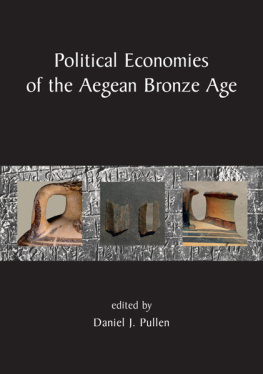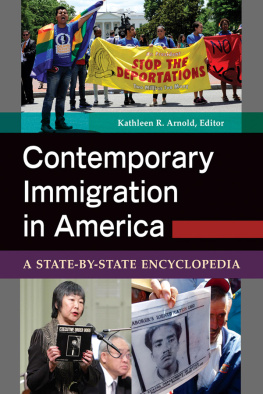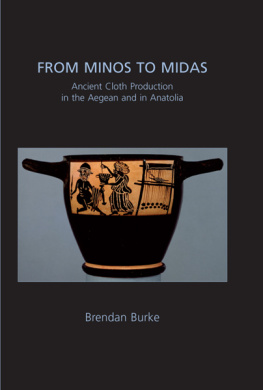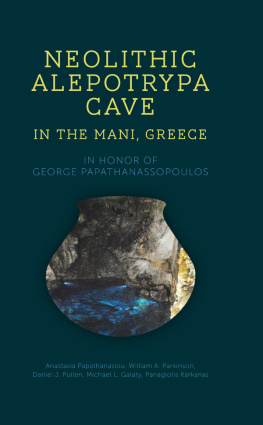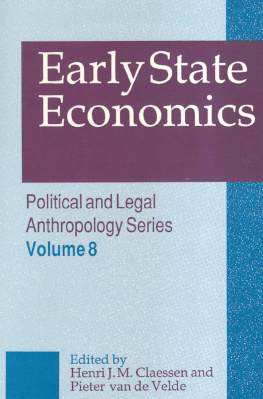
Published by
Oxbow Books, Oxford, UK
Oxbow Books and the individual authors, 2010
ISBN 978-1-84217-392-3
EPUB ISBN: XXXXXXXXXXXXX
Cover images:
Late Helladic III stirrup jar from Knossos, Image Trustees of the British Museum.
Obsidian blade segments from Korphos-Kalamainos, Image SHARP.
Late Helladic III stirrup jar from Mycenae, Image Kim Shelton.
Linear B tablet Jn 829 from Pylos, Courtesy of the Program in Aegean Scripts,
University of Texas, and the University of Cincinnati Department of Classics.
This book is available direct from:
Oxbow Books, Oxford, UK
(Phone: 01865-241249; Fax: 01865-794449)
and
The David Brown Book Company
PO Box 511, Oakville, CT 06779, USA
(Phone: 860-945-9329; Fax: 860-945-9468)
or from our website
www.oxbowbooks.com
A CIP record for this book is available from the British Library
Library of Congress Cataloging-in-Publication Data
Langford Conference of the Department of Classics (2007 : Florida State University)
Political economies of the Aegean Bronze Age : papers from the Langford Conference, Florida
State University, Tallahassee, 22-24 February 2007 / edited by Daniel J. Pullen.
p. cm.
Includes bibliographical references.
ISBN 978-1-84217-392-3 (alk. paper)
1. Bronze age--Aegean Sea Region--Congresses. 2. Aegean Sea Region--Economic conditions
-Congresses. 3. Aegean Sea Region--Politics and government--Congresses. 4. Aegean Sea
Region--Antiquities--Congresses. 5. Crete (Greece)--Economic conditions--Congresses. 6. Crete
(Greece)--Politics and government--Congresses. 7. Crete (Greece)--Antiquities--Congresses.
8. Minoans--Congresses. 9. Civilization, Mycenaean--Congresses. I. Pullen, Daniel J., 1954- II.
Title.
DF220.L36 2007
330.93801--dc22
2010002774
Printed and bound in Great Britain by
Hobbs the Printers Ltd, Tott on, Hampshire
Preface
The contributions to this volume were originally delivered at the Spring 2007 Langford Conference entitled Political Economies of the Aegean BronzeAge, held at the Florida State University in Tallahassee 2224 February 2007. Papers were circulated in advance, and a response prepared by James Wright. Subsequently the papers and the response were revised for publication (the contribution by Donald Haggis, Stability and the State: A Diachronic Perspective on Pre-State Society in the Aegean was not submitted for publication here). I would like to thank the authors for their timely responses and an anonymous reviewer for comments. Bill Parkinson, Dimitri Nakassis, and Michael Galaty also provided comments and editorial assistance.
I would like to thank the George and Marian Langford Family Endowment in the Department of Classics at the Florida State University for funding the conference, Patrick Byrne and Jeff Bray for helping make the conference a smooth-sailing operation, and Kevin Wohlgemuth for providing editorial assistance. My colleague Bill Parkinson, formerly of the Department of Anthropology at Florida State and now at the Field Museum of Chicago, deserves gratitude for letting me bounce ideas off him over many lunches and emails and for co-hosting the conference. I would also like to thank my colleagues and graduate students in the Classics and Anthropology Departments who pitched in and helped in many ways to make the conference the success that it was.
Daniel J. Pullen
March 2009
Contributors
PETER M. DAY
Department of Archaeology
University of Sheffield
Northgate House
West Street
Sheffield S1 4ET
UK
JAN DRIESSEN
Archologie et Histoire de lArt
Universit Catholique de Louvain
Collge Erasme
Place B. Pascal 1
1348 Louvain-la-Neuve
Belgium
MICHAEL L. GALATY
Department of Sociology and Anthropology
Millsaps College
1701 North State Street
Jackson
Mississippi 39210
USA
JOANNE M. A. MURPHY
Department of Classical Studies
University of North Carolina at Greensboro
PO Box 26170
Greensboro
North Carolina 27402-6170
USA
DIMITRI NAKASSIS
Department of Classics
University of Toronto
Lillian Massey Building 123A
125 Queens Park
Toronto
Ontario M5S 2C7
Canada
WILLIAM A. PARKINSON
Department of Anthropology
Field Museum of Natural History
Chicago
Illinois 60605
USA
DANIEL J. PULLEN
Department of Classics
The Florida State University
205 Dodd Hall
Tallahassee
Florida 32306-1510
USA
MARIA RELAKI
Department of Archaeology
University of Sheffield
Northgate House
West Street
Sheffield S1 4ET
UK
ILSE SCHOEP
Onderzoekseenheid Archeologie
Universitet katholieke Leuven
Blijde-Inkomststraat 21
3000 Leuven
Belgium
KIM SHELTON
Nemea Center for Classical Archaeology
Department of Classic
University of California
Berkeley
California 94720-2520
USA
THOMAS F. TARTARON
Department of Classical Studies
University of Pennsylvania
Cohen Hall 201
249 S. 36th Street
Philadephia Pennsylvania 19104-6304
USA
SIMONA TODARO
Dipartimento SAFIST
Facolt di Lettere e Filosofia
Universit di Catania
Via Biblioteca 4
95124 Catania
Italy
SOFIA VOUTSAKI
Institute of Archaeology
University of Groningen
Poststraat 6
9712 ER Groningen
The Netherlands
CHERYL A. WARD
Center for Archaeology and Anthropology
Coastal Carolina University
Conway
South Carolina 29528
USA
JAMES C. WRIGHT
Department of Classical and Near Eastern Archaeology
Bryn Mawr College
Bryn Mawr
Pennsylvania 19010-2899
USA
Abstract
This volume brings together an international group of researchers to address how Mycenaean and Minoan states controlled the economy. The contributions, originally delivered at the 2007 Langford Conference at the Florida State University, examine the political economies of state (and pre-state) entities within the Aegean Bronze Age, including the issues of:
- centralization and multiple scales of production, distribution, and consumption within a polity
- importance of extraregional trade
- craft specialization
- role of non-elite institutions
- temporal/diachronic variation within regions
- Aegean political economy as a monolithic process
- political economy before the emergence of the palaces
The contributors address these issues from an explicitly comparative perspective, both within Minoan or Mycenaean contexts and across Minoan and Mycenaean contexts. The conclusions reached in this volume shed new light on the essential differences between and among Minoan and Mycenaean states through their political economies.
INTRODUCTION
Daniel J. Pullen
Goals of the Volume
The issues of state formation and the nature of states in the Aegean have emerged as major concerns in recent Aegean scholarship (Parkinson and Galaty 2007). The political economies of these states likewise have seen increased attention by Aegean scholars. Aegean states have always been recognized as secondary states, on the periphery of primary states in Egypt and the Near East, but until recently have received little attention outside the world of Aegean studies. The study of Aegean polities by Aegeanists all too often has focused on specific culture-historical patterns, has utilized an approach that obscures variation (
Next page
